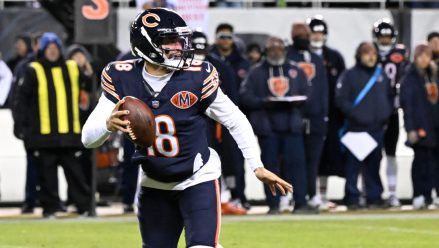Isn’t it time for the wagering industry to say no?
Within 12 months, Illinois lawmakers moved — to use a sports cliche — the goalposts. Not once, but twice. In 2024, they more than doubled the wagering tax on the state’s biggest sports betting companies. In 2025, they again penalized the most prolific companies with a first-of-its-kind per-wager tax.
The Sports Betting Alliance — at the time comprised of BetMGM, DraftKings, ESPN, Fanatics Sportsbook, and FanDuel — fought against these increases by threatening to leave the state, limit new investments, and offer subpar products to residents. It doesn’t appear that any of those have happened. And I am perplexed.
The level of sports betting tax in the fifth biggest legal sports betting state is now nearly 350% more than it was in June 2024. So, why are operators still there?
Joe Stauff, senior equity research analyst at Susquehanna, explained.
“I don’t know of any situation other than the Boston Tea Party that had to deal with a tax increase of that level,” he said, after noting that the 2024 bump raised tax rates by 240%, and the biggest operators went from paying a 15% flat tax to a “blended” 36%. “And that was in the first year. In the second year, the effect of the per-wager tax then raises the blended tax rate by nearly 140% to approximately 50% from 36%.
“It’s a business, so businesses are going to adjust for those particular conditions,” he continued. “Illinois deliberately targeted FanDuel and DraftKings with these higher tax rates, choosing winners and losers, and that’s a massive issue. The question is, can the other operators gain enough scale now to make their businesses within that state profitable? Maybe. But unlikely given there is still a large product quality gap. The pattern is that jurisdictions with irrational tax and regulatory burdens force customers out of the legal markets and back into the black markets where none of the betting activity is taxed.”
Take the money and run
My knee-jerk reaction is that every gambling operator should leave the state to teach Gov. JB Pritzker and his legislature a lesson. Legal sports betting operators paid the state $277.5 million in taxes last year. (In 2023, they paid $150.3 million.) That should be enough money to get someone’s attention, I posited. And how come governments aren’t beholden to the same rules as commercial business?
But exiting Illinois — or any state — wouldn’t just punish Pritzker and the legislature. “You’re not going to mortally wound yourself to make your point,” Stauff said. Despite the massive 2024 tax increase, operators in Illinois are still turning a profit, albeit a smaller one, so pulling out of the state would hurt the bottom line.
In business, you must make money to spend money. To make money, you must sell your product, find the most cost-effective way to get things done, and sometimes you have to go without. In government, it seems, you can make bad decisions, waste money, and not have to go without. Instead, you levy new taxes.
Stauff called the lawmakers in Illinois irrational and pointed to the state’s massive deficit. He reminded me that lawmakers often look for the path of least resistance to stanch the bleeding. Gambling in Illinois, it seems, is that path of least resistance.
Operators won’t willingly leave the state. They’re not going to throw aways tens of millions of dollars in investment just because the rules have changed. Instead, they did something lawmakers may not have anticipated . They are quite literally passing the buck — or the quarter or 50-cent piece, in this case.
Cost of new tax? $125 million/year
On July 1, wagering companies in Illinois began paying a first-of-its-kind per-wager tax — 25 cents per wager for the first 20 million bets a company takes, and 50 cents for any over 20 million. In May, Illinois lawmakers stuffed a first-of-its-kind per-wager tax into the state budget on the final day of the session. The new tax seemed to surface with no warning and was included in the budget 24 hours later. It is expected to cost operators nearly $125 million per year.
For comparison, states like Massachusetts and New Jersey took in between $130-$145 million in total tax revenue in 2024.
FanDuel was the first to announce the plan to pass that cost along, followed by DraftKings and Fanatics Sportsbook. FanDuel and DraftKings, which got serious pushback after pitching a similar plan in 2024, will charge bettors 50 cents per wager beginning Sept. 1. Fanatics, which may not cross the 20-million bet threshold, will charge 25 cents but has not announced when that will start.
The high cost of doing business in Illinois will ultimately be bad for business, Stauff and many others have said.
Jeff Benson, Circa Sportsbook’s director of operations, told InGame that lawmakers and educators don’t “understand what they are doing and the harm it causes in the ecosystem with essentially what is a handle tax.” Circa is the smallest operator live in Illinois and pays the lowest tax (20%) on adjusted gross revenue. But that is still up from 15%.
Passing on the cost of the new tax could anger consumers and send them offshore or to a neighboring state. Border states Indiana, Iowa, and Michigan all offer legal sports betting in more business-friendly climates and without a pass-it-on surcharge. Benson said there are a few other ways that operators could have pushed back, including offering “slightly worse pricing” or “raising the minimum bet threshold.”
The new tax will shrink the number of operators in Illinois because they won’t be able to afford the cost of doing business. Ironic for a state that has no cap on the number of licenses and strove for an open, competitive market.
See ya
In April, the latest month for which an Illinois sports betting revenue report is available, FanDuel and DraftKings paid the state a combined $30 million out of $38.7 million in taxes. That means the remaining eight operators paid a total of $8.7 million. Fanatics Sportsbook was third in terms of handle and revenue, followed by BetMGM, bet365, and BetRivers. Will all of those companies — or Caesars Sportsbook, Circa Sportsbook, ESPN Bet, or Hard Rock Bet — still be there in a year?
“The government, by pursuing a high-tax, high-fee strategy, assures that there can only be a few competitors,” Stauff said. “The high-tax, high-fee policies ensure limited competition because you need scale. They also choke off all the ancillary businesses and industries that participate in the ecosystem.”
So, besides potentially signing a death warrant for some operators, state lawmakers potentially screwed themselves and the local businesses they purport to support. Fewer wagering platforms and the higher costs for the ones that remain mean fewer marketing and advertising dollars spent. The trickle-down effect will be fewer jobs, shuttered businesses, and fewer tax dollars.
I started this column angry at the industry after all that’s happened in Illinois and elsewhere. Despite calling the 51% tax rate in New York untenable, operators fought for the nine available licenses there. They couldn’t stop Ohio Gov. Mike DeWine from doubling the tax rate in 2023. And this year, lawmakers in Louisiana, Maryland, and New Jersey raised tax rates, albeit by 6.5% or less.
The SBA had some choice words for Illinois lawmakers this year and last, but there was virtually no pushback in states that passed smaller increases. Sources told me that it just wasn’t worth the lobbying or marketing spend for big companies to fight smaller increases. DraftKings and FanDuel have scale, combining to own more than 80% of the U.S. digital sports betting market. So, you gotta pick your battles.
Illinois is desperate. So the big operators are doing what they have to do.
Illinois voters sent tens of thousands of e-mails opposing the 2024 and 2025 tax hikes. But their pleas were ignored during what Stauff called a “money grab associated with a dire fiscal imbalance.”
Passing on the new tax leaves the decision whether to bet or not to the very people who put Illinois lawmakers in office.






